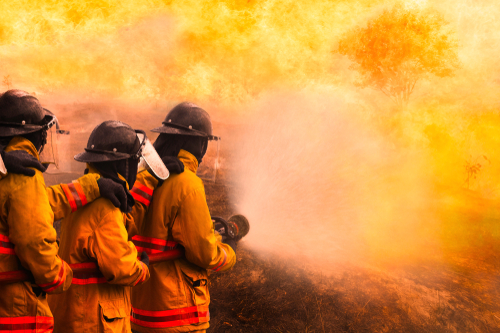
Hitting back at a group suing the U.S. Forest Service to block the use of fire retardant nationwide without an exemption permit under the Clean Water Act, U.S. Reps. Jimmy Panetta (D-CA) and Doug LaMalfa (R-CA) introduced new legislation to make that exemption standard.
Currently, agencies operate with the unspoken acceptance that a National Pollutant Discharge Elimination System (NPDES) permit is not required for the use of fire retardant because of the wording of existing regulations. Retardant helps contain or slow the spread of wildfires. The Forest Protection and Wildland Safety Act would enshrine its exemption at all levels – federal, state, local, and tribal – so it could not be challenged again.
“Wildfires present an imminent danger to our communities in California, and our firefighters need to be equipped and ready to fight them,” Panetta said. “This bipartisan legislation will ensure fire retardant remains a critical tool in our firefighting arsenal for the 2023 fire season. Protecting our communities and forests is paramount.”
All of this stems from a lawsuit filed by the Forest Service Employees for Environmental Ethics, an Oregon-based environmental group that claims the Forest Service violated the Clean Water Act by getting fire retardant into waterways. It claimed that much of the time, the retardant fails to prevent the spread of wildfires.
Firefighters, however, have disputed this claim. John Gould, president of the United Aerial Firefighters Association (UAFA), recently characterized fire retardant as a proven, essential tool for assistance in the containment, control, and defeat of wildfires – and fears the imposition of a restraining order by a federal court.
“Fire retardant is an essential tool in wildland firefighting, especially in the West,” LaMalfa said, backing that logic. “Not only is it absurd to try to take away that tool, it’s flat-out dangerous. These regressive environmentalists are scared that a little bit of fire retardant could get into our rivers while we’re fighting another million-acre fire. But they care nothing about the forests burning down, people and animals fleeing for their lives, and the land covered in ash. Pollution from even larger fires will not only harm fish, but the air pollution will choke vulnerable people up to hundreds of miles away.”
For its part, communications from the Environmental Protection Agency (EPA) dating back to 1993 indicated a permit was not required for retardant. Nevertheless, Forest Service Employees for Environmental Ethics pushed in court for an injunction on using fire retardant until the Forest Service receives an NPDES permit. Even now, though, the 2023 fire season has already begun. More than 60,000 acres have burned in the first few months of the year, adding pressure to the issue.
Panetta and LaMalfa’s legislation was backed by 22 other members of Congress, and companion legislation was introduced in the Senate by U.S. Sen. Cynthia Lummis (R-WY).




